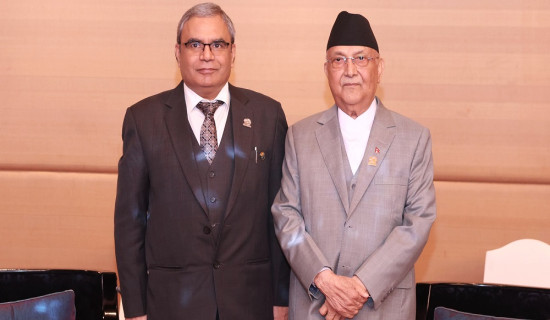- Saturday, 5 April 2025
Mystical Memories Of Janakpur
The moment I set foot in Janakpur, I could hear the whisper from thousands of years ago when Ashtavakra, his body bent in eight places, walked these very streets, the streets of ponds and temples. I could almost make out his voice, serene and composed, debating philosophy with King Janak under the shade of a now-vanished neem tree. And somewhere between their voices, the faint jingle of Mother Sita’s anklets, along with her childlike giggle, stirred within me. It was only then that I found myself standing before the sacred Janaki temple, gazing at the entire panorama with astonished eyes.
I found myself drawn into the history of the place, wondering about the neem tree that is believed to have existed here, whose roots disappeared over time. It is believed that underneath this very neem tree, in the late 17th century, Shri Sur Kishore Das, the priest of the Sitaram Temple of Lohagarh, witnessed the divine presence of this land. It is there that he heard the murmurs of a lost kingdom—where King Janak’s palace once existed, where his goddess-like daughter Sita flowered with grace.
A century later, around 1784, King Pratap Singh of Tikamgarh stirred the heavenly destiny of Janaki temple. He arrived with his queen, and in respectful silence, they took an oath: if blessed with a child, they would construct a temple to heaven’s glory. And so, as if their very gods had intertwined their fate, the queen gave birth to a child, and the oath was sworn—cut into stone, into prayer, into eternity.
And thousands of lives beyond, I was standing before this very heavenly-like temple as its grandeur seeped into my very being.
It looked so alive and intimate, as though I had known it a long, long time ago before I ever stood beneath its alluring domes. Its white spires reached up to the heavens, its archways bore the weight of countless prayers, and in its corridors, time suspended, silent and watchful. Every carved lotus seemed to stir something within me, an awakening to a life just beyond my grasp, something distant yet intimate, like a forgotten dream. I could almost smell the remnants of a past life, its essence lingering in the air, faint and fleeting. It was there, yet just out of reach, dissolving the moment I tried to hold onto it.
I ran my fingers along the pillars, their cold, timeworn surface humming with old memories. The scent of sandalwood curled through the air. As the soft flicker of a thousand lamps cast trembling shadows upon the ancient walls, I felt myself dissolve into the spirit of Mithila, no longer just an observer but a part of something vast, something eternal.
I could see it now, no longer as a memory or a story, the marriage of Lord Ram and Mother Sita, as if time itself had unravelled before me. The palace shone like molten gold with the glow of a thousand oil lamps, their flickering flames mirrored in the eyes of kings and sages. The air was thick with the scent of marigolds and incense. The steady rhythm of Vedic chants rising like a tide, the rustle of silk as Sita stepped forward, her presence as luminous as the full moon. She lifted the garland with hands as steady as fate itself, her eyes unwavering, her heart an unshaken prayer. And before her stood Ram, the prince of Ayodhya, serene and resolute—the kind of presence that shifts the course of time itself. As she placed the garland around his neck, the earth seemed to still, as if the universe had drawn a quiet breath. The gods must have watched in reverence; the stars, perhaps, shone a little brighter. And in that moment, love was not merely a bond between two souls—it was a force, a sacred promise that would echo through eternity.
I wandered around the temple, losing myself in its beauty, in the mystical presence of its ancient scent. And when I had finally absorbed it all, I drifted into the liveliest streets of Janakpur. I strolled along the railway tracks, rested beneath the shade of a sprawling banyan tree, and from the corner of my eye, caught sight of fresh, glistening jalebis—so tempting that I could no longer look away. As if on cue, my stomach growled. And just as fortune would have it, my eyes landed on a tray of golden Ghewar, its honeycomb texture shimmering in the light. Without hesitation, I indulged, blessing my hunger with its delicate taste.
A bull sauntered toward me—unhurried and unbothered. “They roam freely, harming no one,” the locals had reassured me when I’d hesitated outside the Rajdevi temple hours ago—back when another bull had stood like a gatekeeper before the entrance. Now, I met this one’s gaze—eyes steeped in some ancient sorrow, yet oddly captivating.
On a whim, I offered it a jalebi, a small sugary truce. But it merely turned away, indifferent, as if I were just another creature in this wandering world, too exhausted to care.
However, I continued my wanderings. In Janakpur, one does not simply visit without surrendering to Panipuri. I had often heard this from my school friends who were from Janakpur. The streets were lined with Panipuri stalls, leaving me in a dilemma about where to go. Then, my eyes landed on a stall teeming with people. I reasoned that it must have Panipuri worth gobbling—why else would so many people be there? So I heaved myself, cutting through the crowd. I only had one plate of Panipuri, for the spice was so powerful that it raged a war in my stomach. I sucked in a quick breath, then let out a sharp ‘hss—sss’, as if the sound itself could take the heat burning my tongue.
With the grace of God, I caught a signboard: “Ham Yehi Peete Hai Lassi.” Struck by its poetic confidence, I ran to the shop, ordered a lassi, and oh, when the lassi finally caressed my scorched tongue, it wasn’t mere relief—it was transcendence.
The evening seemed to be in a hurry today, I thought, as it peeled away the clouds of the afternoon slowly and deliberately. As the sun sank into gold, a gentle wind stirred, weaving through the streets and slipping between the branches of trees, rustling their leaves with a sound like soft whispers. The neem and peepal trees swayed, their shadows stretching long and thin across the ground, dancing in the fading light. The breeze carried with it the smell of earth, of dust and of fresh jasmine, a fragrance that seemed to pull the city into its arms and soothe it after the day’s heat.
The day was so overwhelming that I had to sit beside the pond of Janaki Temple, observing and absorbing everything that reeled within me. I found my fingers skimming the cool water as I scattered bits of food. The fish swarmed in a quiet frenzy, their sleek bodies gliding through the shimmering reflections of the temple’s domes. The surface quivered at their touch, sending ripples outward—little silver rings expanding, stretching, then vanishing into stillness once more.
I watched the trees sway in quiet grace across the pond. The loud music that had moments ago consumed the streets—rattling shutters, trembling tin roofs—now felt distant, almost weightless. Beneath the blare of speakers and the city’s restless hum, a softer melody whispered at the edges of my senses. It was so hauntingly powerful that it filled me with both joy and sorrow, as if I had lost and found something in the same breath.
(The author is an intern at The Rising Nepal.)









-original-thumb.jpg)







